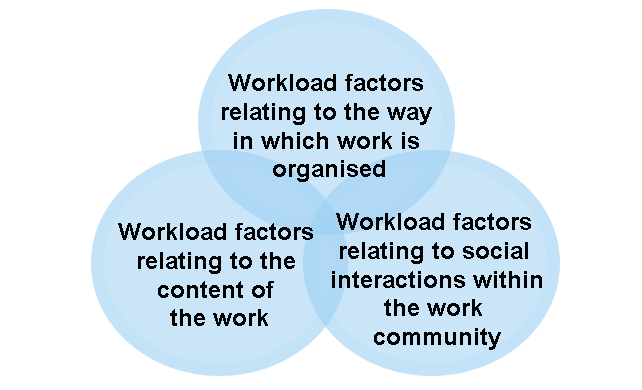

Working conditions
Psychosocial workload factors
Psychosocial workload factors refer to factors relating to the content of work and work arrangements as well as the social dynamics of the work community that can have a harmful impact on employees’ health. Psychosocial workload factors do not just impact on individual employees but on the entire work community. These kinds of workload factors are always related to the content of the work or the working conditions rather than individual employees.

Workload factors relating to the content of the work are factors associated with individuals’ work tasks. Factors that can contribute to work-related strain include, for example,
- monotony
- incoherent job descriptions
- a constant need to be alert
- high quality requirements
- information overload
- frequent interruptions
- unreasonably high levels of responsibility, and
- frequent interactions with difficult customers.
Workload factors relating to the way in which work is organised are factors associated with how work and work tasks are planned, distributed and managed in the workplace. Factors that can contribute to work-related strain include, for example,
- workloads that are either too high or too low
- unreasonably tight deadlines
- irregular working hours, such as shift work, night work or constantly having to be on call, excessive work-related travel outside of working hours or not having a fixed place of work,
- inappropriate work equipment or working conditions, and
- unclear job descriptions, targets or responsibilities or an unclear division of responsibilities.
Workload factors relating to social interactions within the work community that can have an adverse impact on employees’ health include, among others,
- having to work alone
- social or physical isolation
- inefficient teamwork or interaction
- poor communication
- lack of support from management or colleagues
- harassment or other unfair treatment at work, and
- inequality and discrimination.
Potential psychosocial workload factors also include physical factors, chemical or biological agents, or the risk of accidents. Noise, for example, can be a source of work-related strain for employees whose work requires a high level of concentration or communication with others. Other factors that can contribute to employees’ psychosocial workload include the fear of exposure to viruses or mould, for example, and the fear of injury on construction sites.

